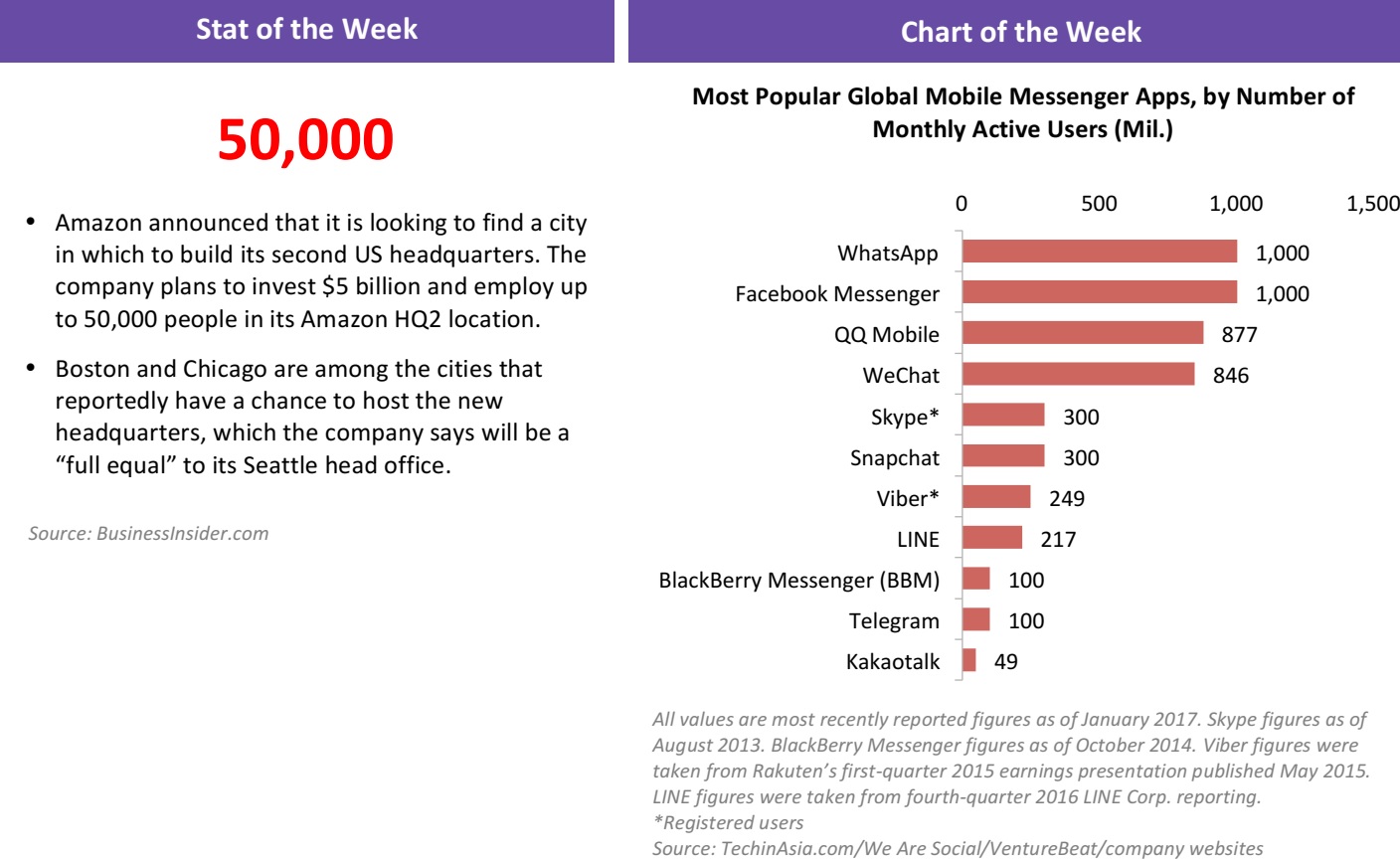
From the Desk of Deborah Weinswig
The New iPhones Are Here: Should You Buy the 8 Now, or Wait for the X in November?
On Tuesday, Apple launched not one long-anticipated new iPhone—but two—whose specifications fell generally in line with rumors and industry watchers’ expectations. There are so many partners and suppliers involved in the creation of any new generation of phones (including an army of talkative workers at Apple’s contract manufacturers in China) that it is nearly impossible to keep the details of such a hotly anticipated, high-volume new product under wraps. Not to mention that last weekend, an Apple employee leaked the latest beta version of the accompanying iOS 11 software, which contained many of the details of the new product releases.
As with practically every new iteration of the iPhone, the new models feature sharper displays, faster processors, better cameras and more memory, and Apple strives to make each new iPhone thinner than the last. Both new models support wireless charging (using the Qi standard) and run iOS 11, which includes Apple’s ARKit software, which will enable a slew of augmented-reality applications and games. IKEA is already working on an app using ARKit that will allow customers to visualize how the company’s furniture looks in their living spaces. Apple calls its new-generation processor A11 Bionic, an homage to the super strength of the man-machine combo in the 70s TV show
The Six Million Dollar Man, and the new phones also contain a new graphic chip to help share the load.
The iPhone 8/8 Plus is essentially a “speed bump” (i.e., it uses a faster processor) based on the iPhone 7 (and iPhone 6). In addition to the faster processor, it offers a better (12-megapixel) camera and the new software. This phone could be the last of the line to include a physical “home” button.
The iPhone X, named in celebration of the 10th anniversary of the iPhone, contains a myriad of features that have been rumored to be coming for some time, such as an all-glass design and the absence of a physical home button. The display runs to the end of the case, enabling a 5.8" display in an enclosure roughly the same size as the iPhone 7. The device uses a sensor array and advanced image recognition technology to identify the user by his or her face, which is necessary because this model does not include a combination home button/fingerprint sensor and because facial recognition is used to authenticate users for Apple Pay. The screen on the iPhone X also has a greater number of pixels to display 4K HD video.
The new version of the iOS smartphone and tablet operating system includes several new features that make Apple’s tablets work more like desktop PCs (likely an effort to catch up with the Microsoft Surface tablet), including a file system, a new dock, multitasking functionality and other features that use the pencil. Users also get better photo-processing software, an improved Siri virtual assistant and the ability to send money via Apple Pay (similar to the functionality offered by the popular Venmo app). iOS 11 also provides users the ability to send animated emoji to friends and family.
Note that the “X” in the name of the latest version represents the Roman numeral for 10 and is not meant to be read as the letter “X.” There is precedent here, as the first modern generation of the MacOS following Steve Jobs’ return to Apple was initially called OS X, representing version 10 of the Macintosh operating system.
Both new iPhone models include wireless charging, which continues the trend of freeing the user from the burden of needing to carry a bundle of cables. First, Apple removed the conventional headphone jack in favor of a power/headphone combo connector in the iPhone 7, encouraging users to migrate to wireless headphones. Now, the company has made the power cord optional. Wireless charging is a technology whose development is still in progress, and Apple does not currently offer a wireless charger. However, the company demonstrated a charging mat that can charge the iPhone, the Apple Watch and AirPods (the company’s wireless headphones) together.
Apple detractors note that Samsung smartphone models have offered features such as bezel-free displays, wireless charging and waterproofing for some time—and the $999 price tag of the iPhone X is bound to sting. However, hardcore Apple fans will likely see their main dilemma as having to decide whether to buy the iPhone 8 for $699 now to get their hands on the new features right away, or wait until November 2 to get the iPhone X and earn the associated envy from the technorati. The iPhone X represents the first new iPhone design and form factor in three years, which will likely lead a large number of users to upgrade to it—but those who opt to wait to purchase the X may find that its high price tag reduces the amount of cash they have available to fill Christmas stockings this holiday season.
 US RETAIL EARNINGS
US RETAIL EARNINGS

Source: Company reports
US RETAIL & TECH HEADLINES
 Alipay Pushes into US Retail
(September 12) BusinessInsider.com
Alipay Pushes into US Retail
(September 12) BusinessInsider.com
- Major Chinese mobile wallet Alipay has partnered with luxury fashion retailer Rebecca Minkoff to enable Chinese tourists in the US to make purchases using Alipay at all Rebecca Minkoff retail locations—including those in New York, Chicago and Los Angeles—and online.
- This partnership continues Alipay’s effort to expand its massive network of 520 million active global users. In the last year alone, the mobile wallet expanded into Europe, Asia, Australia, South Africa and the US. The partnership continues the series of expansion efforts by Alipay to target Chinese tourists globally.
 Harvey, Irma to Hit US Apparel Retailers More than Restaurants
(September 12) Reuters.com
Harvey, Irma to Hit US Apparel Retailers More than Restaurants
(September 12) Reuters.com
- Industry-wide retail sales in August and September will fall in the wake of Hurricanes Harvey and Irma, with apparel retailers expected to take a longer-term hit than restaurant operators. US same-store sales at apparel chains are expected to rise just 0.1% in the third quarter ending October, compared with a 0.6% increase seen before the storms.
- The two high-intensity hurricanes, which made landfall in the US over the past two weeks, have killed dozens and damaged thousands of homes in Texas and Florida. As residents in these states begin to rebuild their houses, home improvement chains including Home Depot are well positioned to benefit.
 Walmart Is Simplifying Its Sprawling US Store Operations
(September 12) Bloomberg.com
Walmart Is Simplifying Its Sprawling US Store Operations
(September 12) Bloomberg.com
- Walmart is reorganizing its US store operations to simplify the sprawling business as part of a bid to maintain growth and compete with the likes of Amazon. The idea is to react more quickly to changes and better communicate.
- The retailer will consolidate its US business to four divisions, down from six, each of which is managed by a senior vice president. In simplifying its US business, Walmart said it is returning to an approach it was using before another reorganization a few years ago. The number of US regions will be reduced from 44 to 36, and executives affected by the move could take other roles inside the company.
 Amazon’s Whole Foods Price Cuts Brought 25% Jump in Shoppers
(September 11) Bloomberg.com
Amazon’s Whole Foods Price Cuts Brought 25% Jump in Shoppers
(September 11) Bloomberg.com
- Amazon’s splashy takeover of Whole Foods Market, complete with deep price cuts, did more than bring a surge of publicity to the chain: it boosted customer traffic by 25%. The data, culled from shoppers’ mobile devices, was compared with the same period a week earlier.
- The traffic data is an optimistic sign that Amazon can succeed in the brick-and-mortar world. In some areas, the jump in customers was dramatic. At stores in Chicago, 35% more shoppers visited Whole Foods stores in the week after the takeover.
EUROPE RETAIL HEADLINES
 JD Sports Reports 1H18 Sales Growth of 41%
(September 12) Company press release
JD Sports Reports 1H18 Sales Growth of 41%
(September 12) Company press release
- British sportswear and outdoor retailer JD Sports reported first-half 2018 sales growth of 41%. Sales totaled £1.4 billion (US$1.9 billion) in the period. Pretax profit jumped 33%, to £102.7 million (US$135.6 million). Comparable sales across all banners, including those in Europe, increased by approximately 3%.
- Peter Cowgill, Executive Chairman of JD Sports, attributed the strong performance to “the continued strength of the core UK and Ireland sports fashion fascias.” Cowgill noted that sales in the second half have so far continued at a similar rate as seen in the first half and that management expects JD Sports to deliver further profit growth for the full year.
 Boohoo.com to Launch Own-Brand Beauty Line
(September 11) RetailGazette.co.uk
Boohoo.com to Launch Own-Brand Beauty Line
(September 11) RetailGazette.co.uk
- UK online fashion pure play Boohoo.com has announced plans to launch its own-brand beauty range, called Boohoo Cosmetics, later this month. Products in the line will be priced in the range of £4–£19 (US$5–US$25).
- This news comes just a week after another British online fashion retailer, ASOS, launched its own line of beauty products, called Face + Body.
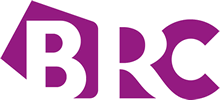 British High Street Footfall Declines in August
(September 11) BRC press release
British High Street Footfall Declines in August
(September 11) BRC press release
- Footfall at British stores fell by 1.2% year over year in August. The decline was slightly greater than July’s 1.1% decrease, according to the British Retail Consortium (BRC). High street footfall declined by 2.6% and shopping center footfall fell by 0.8%, but footfall at retail parks grew by 1.6%.
- BRC Chief Executive Helen Dickinson noted that while most shopping locations witnessed a year-over-year footfall decline, retail parks “bucked the trend, with shoppers attracted by the convenience of a one-stop shop for purchases, services and leisure activities.”
 ManoMano Raises €60 Million to Drive Expansion across Europe
(September 11) BusinessInsider.com
ManoMano Raises €60 Million to Drive Expansion across Europe
(September 11) BusinessInsider.com
- French DIY marketplace ManoMano has raised €60 million (US$72 million) in series C funding from growth equity firm General Atlantic and existing investors Piton Capital, Partech Ventures and Bpifrance.
- With the fresh funds, ManoMano expects to drive expansion across Europe, including in Britain, which is one of its top target markets.
 Eve Sleep Ties Up with Karstadt
(September 8) Retail-Week.com
Eve Sleep Ties Up with Karstadt
(September 8) Retail-Week.com
- Eve Sleep, a British mattress online pure play, has tied up with German department store chain Karstadt to sell its products in Germany. Eve Sleep’s range includes mattresses, pillows and bed frames.
- Once the deal comes into force on November 1, customers can try out Eve Sleep’s products in a showroom-style setting at all 79 of Karstadt’s stores in Germany before ordering them online from either retailer’s website.
ASIA TECH HEADLINES
 Weibo Users Given One-Week Warning to Provide Real Names
(September 8) TechCrunch.com
Weibo Users Given One-Week Warning to Provide Real Names
(September 8) TechCrunch.com
- The 340 million users of Sina Weibo, China’s popular microblogging service, have been given one week to link their accounts to a real name. The crackdown is being conducted in order to comply with new government rules restricting anonymous online conversation.
- There have actually been similar rules in place since 2011, but the company never really enforced them, as it has been demonstrated over and over that enforcing a real-name requirement is easier said than done. Many users would rather quit the service than submit to having their online communications, previously anonymous or pseudonymous, attached to their real identity.
 Japanese Startup Plans One-Stop ICO Platform Fueled by VC Investment and an ICO
(September 8) TechCrunch.com
Japanese Startup Plans One-Stop ICO Platform Fueled by VC Investment and an ICO
(September 8) TechCrunch.com
- China banned initial coin offerings (ICOs), also known as token sales, and it is investigating platforms that facilitate them. Meanwhile, Japan’s Tech Bureau is hatching an ambitious plan to offer a one-stop service to let companies across the world take advantage of blockchain technology and ICOs without violating financial regulations.
- Tech Bureau currently helps companies with consultancy and a range of technical services, but it is preparing to introduce new platforms to cover nearly every aspect of the ICO process.
 China’s UrWork Invests in Indonesia’s ReWork via $3 Million Deal as WeWork Rivalry Heats Up
(September 7) TechCrunch.com
China’s UrWork Invests in Indonesia’s ReWork via $3 Million Deal as WeWork Rivalry Heats Up
(September 7) TechCrunch.com
- UrWork, the unicorn that is competing with WeWork in China, is following its American rival’s lead by extending its reach in Southeast Asia. The move follows UrWork’s participation in a $3 million funding round for Indonesia-based ReWork.
- UrWork is valued at $1.5 billion following recent financing. It has 88 locations in 22 cities in its native China, but it is planning an aggressive overseas expansion into 32 cities worldwide over the next three years. This comes just as WeWork doubles down on China, where it recently launched a local business aimed at rapidly growing the eight spaces it currently operates across Greater China.
 Budget Hotel Network Pioneer OYO Raises $250 Million, Led by SoftBank’s Vision Fund
(September 7) TechCrunch.com
Budget Hotel Network Pioneer OYO Raises $250 Million, Led by SoftBank’s Vision Fund
(September 7) TechCrunch.com
- India-based OYO, a startup that pioneered and popularized the concept of budget hotel networks, has closed $250 million in new funding led by SoftBank’s Vision Fund. The startup was founded in 2013 by Thiel Fellow Ritesh Agarwal, now age 24, and focuses on standardizing the quality of India’s wildly differentiated affordable hotels and providing some structure to simplify bookings and customer service.
- OYO’s network spans 230 cities across India, Malaysia and Nepal, offering more than 70,000 rooms in India alone. The company said it is getting close to growing its capacity at a rate of 10,000 rooms per month, and it plans to push on into more rural parts of India and move into additional overseas markets, too, although it has not specified which ones.
LATAM RETAIL AND TECH HEADLINES
 WhatsApp Eyes Enterprise Growth in Brazil
(September 6) ZDNet.com
WhatsApp Eyes Enterprise Growth in Brazil
(September 6) ZDNet.com
- Instant-messaging app WhatsApp is looking to build on its popularity in Brazil to grow its footprint within the enterprise space. Brazilian bank Itaú, the 10th largest bank in the world by market value, is the most significant local organization to adopt the business version of the app, which is currently being tested with a limited pool of users.
- The bank plans to start a trial with premium customers for communication between account holders and branch managers. Notifications and alerts about the account are also possibilities within the pilot, which will be expanded across the entire client base gradually.
 Brazilian Telco Embratel Announces It Will Launch New Satellite in 2019
(September 8) ZDNet.com
Brazilian Telco Embratel Announces It Will Launch New Satellite in 2019
(September 8) ZDNet.com
- Brazilian telecommunications firm Embratel has announced the launch of its 12th satellite, the largest ever made by the company. Due to launch at the end of 2019, Star One D2 will have a lifespan of more than 15 years.
- Star One D2 will have 28 C-band transponders, 24 Ku-band transponders and 20 Gbps of Ka band capacity to meet backhaul demands of mobile telephony. The satellite will be the second in the company’s fourth-generation fleet and will complement the Ka band coverage of the latest satellite launched, Star One D1.
 Lenovo Bounces Back in Brazil After a Slump Last Year
(September 6) ZDNet.com
Lenovo Bounces Back in Brazil After a Slump Last Year
(September 6) ZDNet.com
- Lenovo has started to show improvement in its Brazilian business after some years of hardship. The company has posted 1.3% growth in net profit, reaching R$1.5 billion (US$480 million).
- Last year, Lenovo posted an 82.6% slump in net profit, with operational losses reaching R$1.16 billion (US$371 million). The Chinese company ranks third in PC sales in Brazil, behind HP and Dell, with a 13% market share.
 Brazilian PC Market Sustains Growth
(September 11) ZDNet.com
Brazilian PC Market Sustains Growth
(September 11) ZDNet.com
- PC sales in Brazil returned to growth in the second quarter of 2017, according to figures released by analysis firm IDC. Between April and June 2017, some 1.243 million PCs were sold, a 5% increase from the same period last year.
- This follows the positive performance seen in the first quarter of 2017, when the Brazilian PC market started to show signs of recovery after five consecutive years of decline. Notebooks remain the preferred device of most PC buyers in Brazil. Of all the PCs sold in the second quarter, 396,000 were desktops, while notebooks accounted for 847,000 units.
MACRO UPDATE
Key points from global macro indicators released September 6–13, 2017:
- US: The ISM Non-Manufacturing Index reading increased from 53.9 in July to 55.3 in August, pointing to an expansion in the services sector. The Job Openings and Labor Turnover (JOLTS) job openings figure ticked up in July, reflecting an improving job market.
- Europe: In the UK, industrial production increased by 0.2% month over month in July, in line with the consensus estimate. The Consumer Prices Index (CPI) and housing prices in the UK edged up further in August, clearing the way for an interest rate hike by the Bank of England.
- Asia-Pacific: In China, foreign reserves stood at $3.09 trillion in August, slightly below the market’s estimate. The August trade balance in China was also below the consensus estimate, at $42.0 billion, due to higher import and lower export values.
- Latin America: In Brazil, inflation remained at an acceptable level in August, increasing by 2.5% year over year. Retail sales in Brazil increased by 3.1% year over year in July. In Mexico, industrial production dropped by 1.0% month over month and by 1.6% year over year in July.
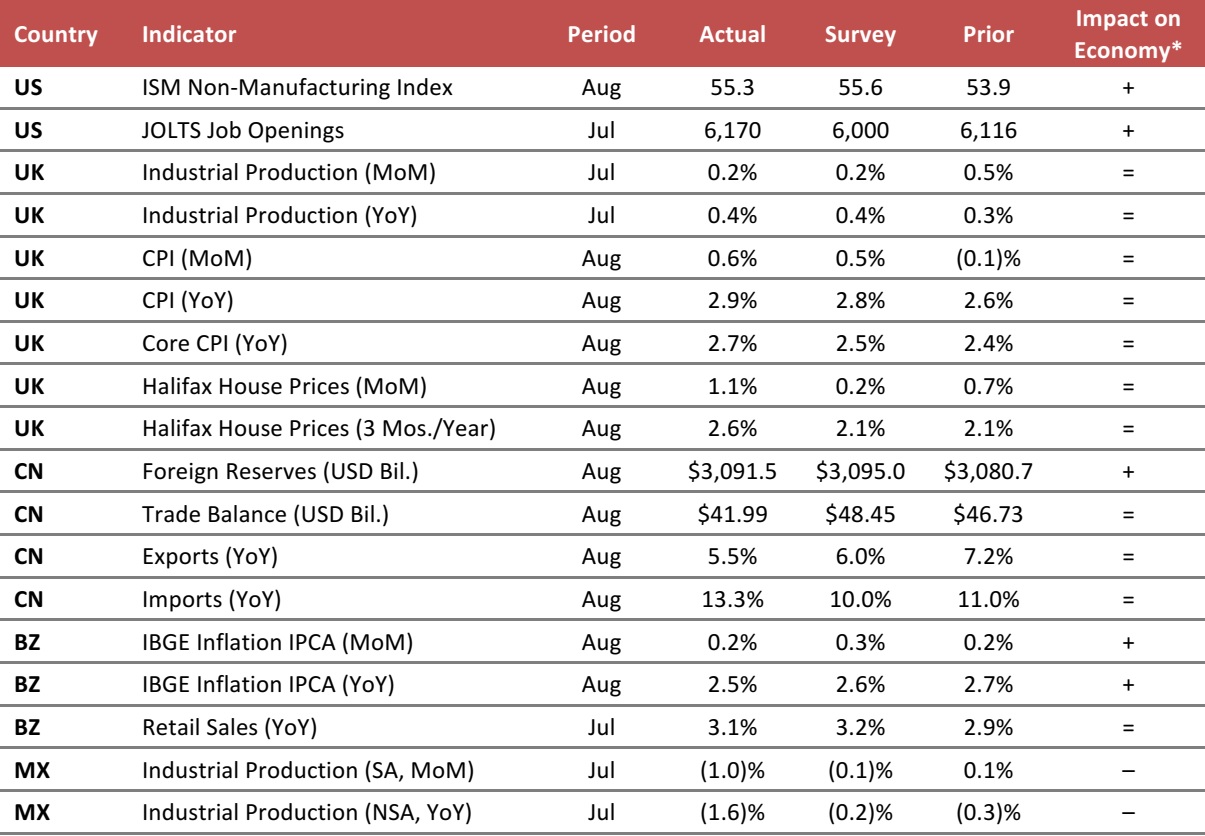
*FGRT’s evaluation of the actual figure’s impact on the economy relative to historical benchmarks and the current macroeconomic environment: + indicates a positive signal for the country’s economy, – indicates a negative signal and = indicates a negligible or mixed impact.
Source: Institute for Supply Management (ISM)/US Bureau of Labor Statistics/UK Office for National Statistics/Markit/Halifax/The People’s Bank of China/China General Administration of Customs/Instituto Brasileiro de Geografia e Estatística/Instituto Nacional de Estadística y Geografía/FGRT
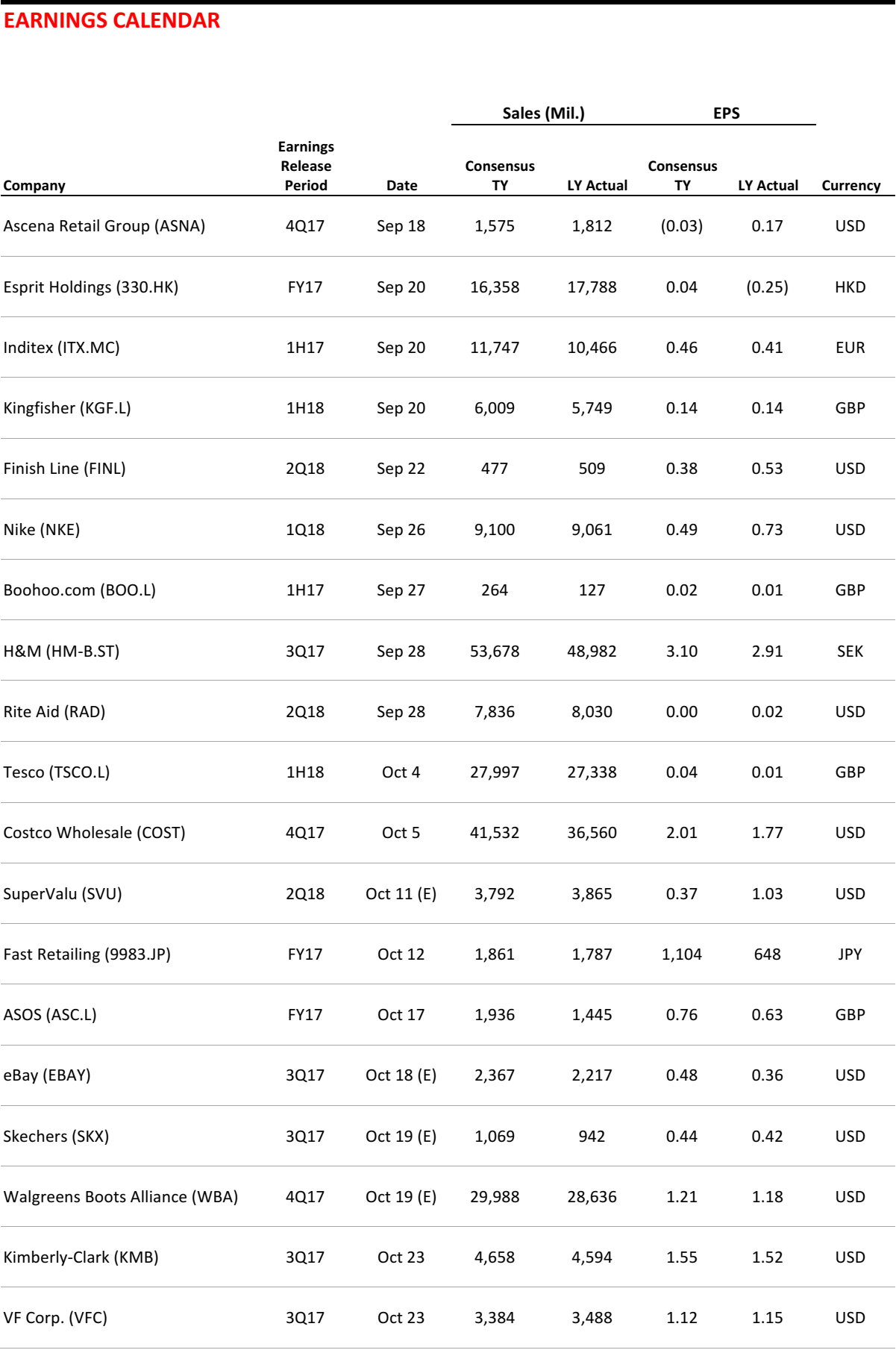
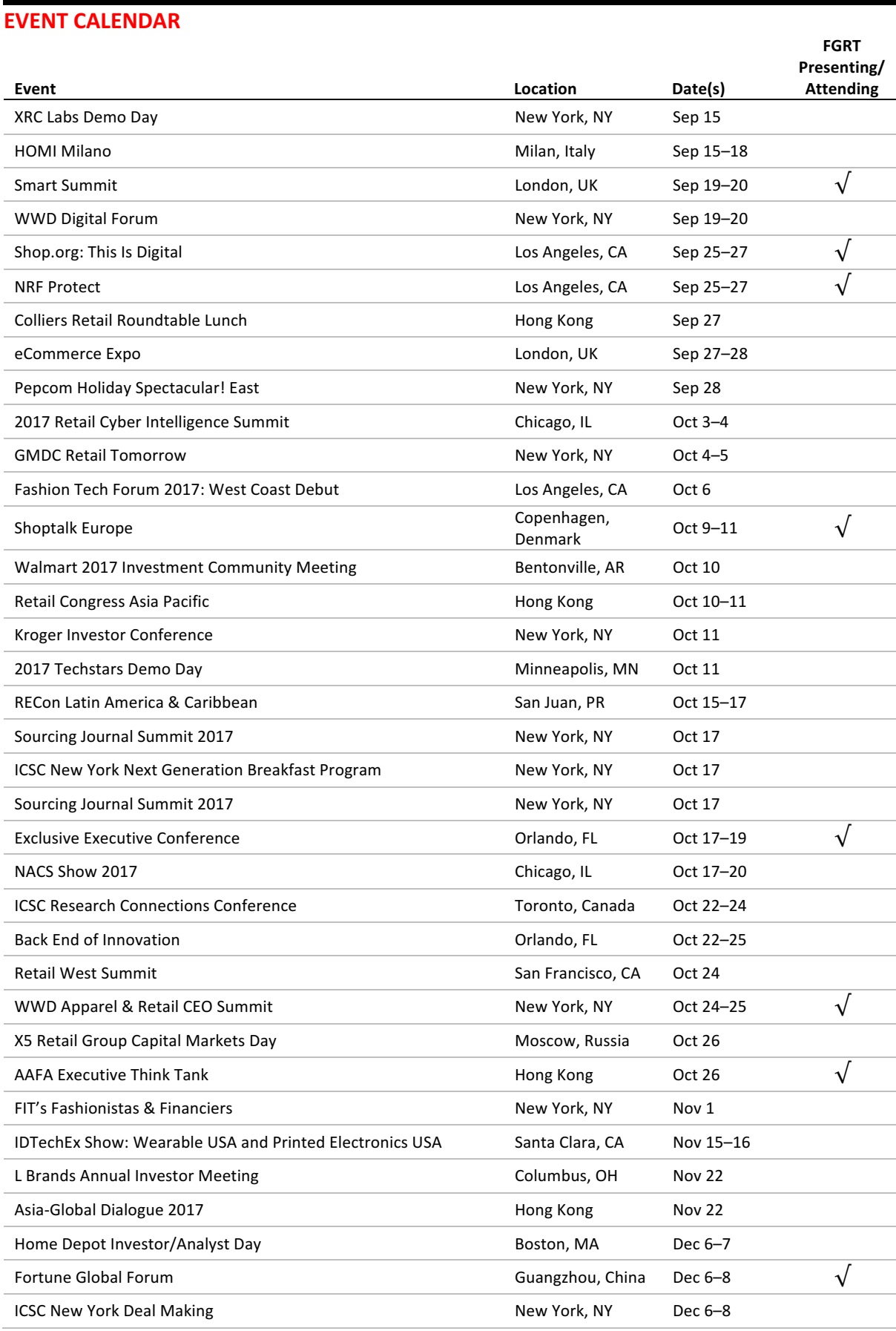
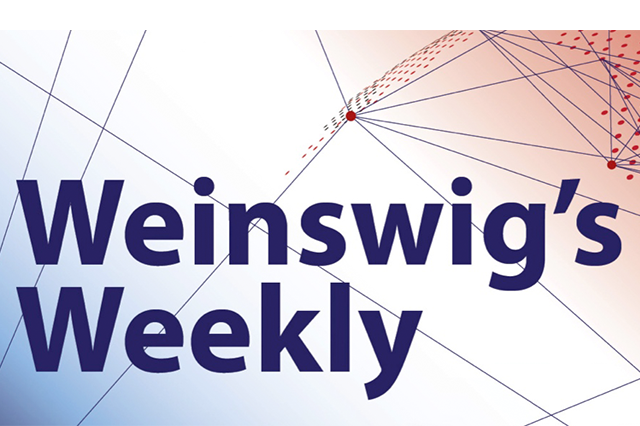

 US RETAIL EARNINGS
US RETAIL EARNINGS
 Brazilian PC Market Sustains Growth
(September 11) ZDNet.com
Brazilian PC Market Sustains Growth
(September 11) ZDNet.com


